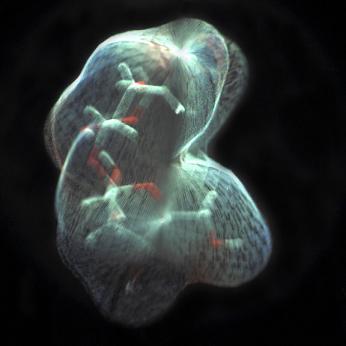What is information? According to the
Webster dictionary, it is the
knowledge obtained from investigation, study, or instruction. In our everyday world, when we gain information, that means we have learnt something new to
add to our existing knowledge. It seems things are a bit murkier (as usual!) in the world governed by
Quantum Mechanics:). Quantum Mechanics describes the world of the smallest, of the
Protons,
Neutrons and
Electrons, and it is possible to have something called
Negative Information in that world:)).

Electron Cloud around a Sugar Molecule (Courtesy: Actuality Systems)So what is
Negative Information? According to the
Heisenberg Uncertainty Principle, at the quantum level, we cannot accurately compute
both the position and the velocity of a particle (say, an electron). When we try to accurately find the position, there will be a large error in (our knowledge of) the velocity, and vice-versa. That is how the sub-atomic world works, and there is no way around it. Thus, there is a fundamental limit on
how much we can know about a particle, and therefore about any set of particles. Since we cannot pin-point the electrons (or any other particle), we can only estimate their probabilities of being at any place at any given time, and can visualize this probability as a electron cloud.
However, there are situations when one might be able to know more than they are supposed to:D. The Uncertainty Principle, that stops us from knowing too much, also allows us to know too much for a while, and then let us know
too less:)). So, over time, the principle is satisfied, but for small durations of time, you might be able to know more than you are supposed to know. The principle cancels out this
extra knowledge by providing misleading, or
negative information. Funny thing is: since you do not know when the system is providing accurate or inaccurate information, you do not know if you are getting more, or less:D:D.
This
discovery, that quantum knowledge can be negative was made by three researchers, Drs Michal Horodecki, Jonathan Oppenheim and Andreas Winter, of the Universities of
Gdansk,
Cambridge and
Bristol. Their work was published in
Nature in August 2005:):).